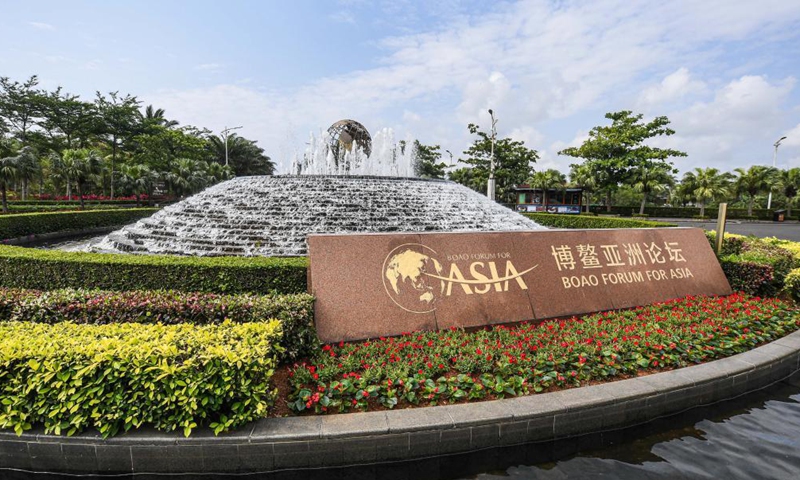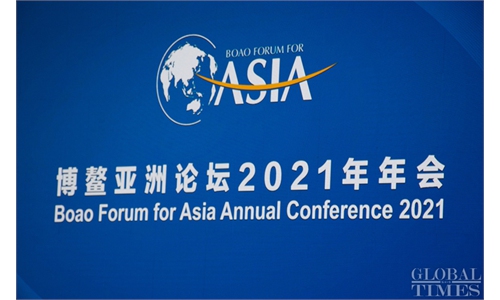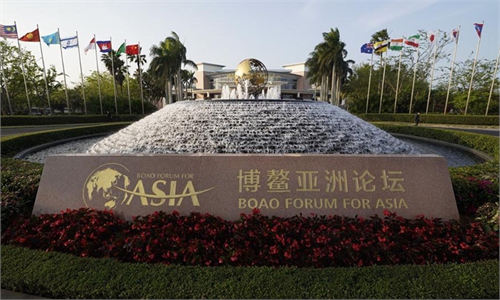
Photo taken on April 8, 2021 shows the Boao Forum for Asia (BFA) International Conference Center in Boao Town, south China's Hainan Province. Over 4,000 people will attend the Boao Forum for Asia (BFA)'s annual conference, which is scheduled for April 18 to 21 in Boao, south China's Hainan Province. Photo: Xinhua
The China-US relationship is likely to be competitive in many domains, which may mean some level of strategic decoupling, said Henry Paulson, former US treasury secretary, who made the comments on Tuesday at the China-US Entrepreneurs Symposium, a sideline event of the Boao Forum for Asia (BFA).
According to an agenda acquired by the Global Times from the BFA Secretariat on Wednesday, talks between China and US entrepreneurs are a routine part of the annual BFA, which is being held in South China's Hainan Province.
Attendees at the forum pointed out existing difficulties in China-US relationship, and they have confidence in the growth potential of their bilateral trade based on past experience of cooperation, BFA Secretary General Li Baodong said at the closing ceremony of Boao Forum on Wednesday.
"We all believe that as the world's two major economies with such different national conditions, friction is normal and can be settled through consultations," Li said.
Relationship between China and the US has never been easy and simple since the two established diplomatic relations, it's been complicated, Li added.
The China-US relationship was a hot topic at Boao, as the forum called for multilateralismand greater global economic integration.
This year's dialogue is being held in a candid way and reaching important consensus on some topics. Representatives are also invited to offer ideas on how to settle China-US friction in a variety of fields, such as how to tap bilateral trade potential and promote a sound bilateral relationship, read the document.
The meeting is not open to the media. According to the document from the BFA Secretariat, enterprises that participated in the event included China National Petroleum Corp, China COSCO Shipping Corp, China Datang Corp, BlackRock Inc, Qualcomm, Bridgewater Associates, Goldman Sachs and Visa Inc.
"The US and China continue to have the most important bilateral relationship in the world. But over the course of my career, I've never seen this relationship more fraught. Punitive tariffs have become normalized, while flows of capital, technology, and people have all been significantly curtailed," said Paulson, who stressed the need to avoid an economic "iron curtain" between the two countries and recommended an approach of "targeted reciprocity."
Paulson said that the China-US relationship is going to be competitive in many domains - technological, economic, financial, military and ideological.
Flows of goods, capital, people, technology and data, which were governed mostly by the market, with security concerns carefully managed, are being refracted through the prism of national security or economic competition, he added.
"Take technology, for example, the area that I believe will be the core challenge in the US-China relationship moving forward. It is clear to me that each of our nations will, of necessity, sequester high technologies to protect our national security. And some strategic decoupling will be necessary," Paulson said.
He explained that if the decoupling goes too far, it will create an economic "iron curtain", one that decouples supply chains and erects incompatible rules and standards throughout the global economy, impeding innovation and economic growth.
"These risks are worth avoiding. Economic linkages that are the rightful source of so much tension today do, in fact, benefit both of our nations in important ways, and have the potential to increase to our mutual benefit," Paulson noted.
He suggested the re-establishment of a Strategic Economic Dialogue mechanism to address all the issues on the table, including trade and climate change.
Economic and trade data fully show that the degree of integration and interdependence between China and the US in the economic field far exceeds other bilateral relationships. Even in 2020, when the COVID-19 pandemic was raging around the world, trade between the two countries grew by 8.8 percent year-on-year, reaching more than $580 billion.
The recovery of the global economy after the pandemic and the sustainable development of the world cannot be achieved without the joint efforts of China and the US, read the agenda document.
Qualcomm Chief Executive Officer Steve Mollenkopf, who participated in the China-US Symposium online, said that the possibilities with 5G are far-reaching, and will be best realized when US and Chinese companies unite to drive innovation in order to achieve great things, according to a report from the Xinhua News Agency.
Mollenkopf said he looks forward to future cooperation between US and Chinese companies, adding that Qualcomm is committed to continuing its long friendship with Chinese partners.
"The future of wireless technology has never been more exciting, and the importance of connectivity to China achieving its development goals has never been clearer," Mollenkopf said.



